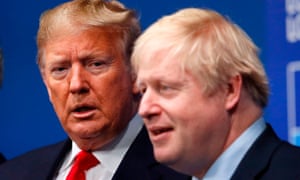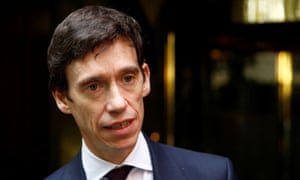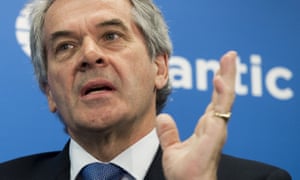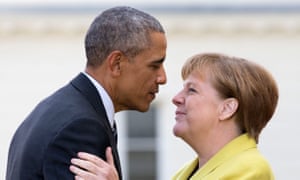Former senior officials also worry Britain may be sidelined if Joe Biden becomes president

Photograph: Peter Nicholls/AFP via Getty Images
The UK’s special relationship with the US may end if Donald Trump wins a second term, some of the UK’s most senior retired diplomats and Conservative foreign policy specialists have said. They also say that if the Democrat Joe Biden wins, Washington may view the EU rather than the UK as its primary partner.
The anxious assessment of what is at stake for Britain in the US presidential election in November has been made on and off the record in a variety of seminars over the past month, and underlines concerns at Trump’s performance during the coronavirus pandemic. It also reflects diplomatic outreach to the UK by Biden’s chief foreign policy adviser, Antony Blinken.
UK diplomats have instead been looking to form a broader alternative alliance of democracies that dilutes dependence on the US.
Rory Stewart, the former Conservative international development secretary, said in one assessment: “If Trump comes in for another four years that will be very challenging for the global system and for Britain’s relationship with the US. If we were to move away from the US, and Trump obviously poses the challenge that that may have to happen, we are going to find ourselves in a situation in which much of our Foreign Office infrastructure had been predicated on working very closely with the US for a very long time.
“If we have to move away from the US, it will involve a much bigger shift in national security infrastructure than we have ever experienced. Almost since Suez, they have been our default.”

The UK had taken for granted for years that it would fall into line with US foreign policy position, he said. Any change to that would require a rethink by the Foreign Office because it “sometimes had no idea what an independent policy would feel like”.
Sir John Sawers, the former head of M16 and a former UK ambassador to the UN, also said Trump’s re-election would be problematic. “There is no doubt President Trump is the most difficult president for us to deal with,” he said.
“He does not really feel that sense of being part of that transatlantic community, he does not really believe in alliances. He does not really believe in American leadership in the world. We are seeing in this pandemic for the first time what a crisis is like without American leadership. It is the first time in our lifetime we have experienced that.
“If he gets elected for a second time some of the changes we have seen in the past few years will become embedded and entrenched and then, absolutely Britain will not be so much a bridge between the US and Europe. We will need to be bounding closely together with our European partners” .
Speaking before the Black Lives Matter protests, he said the election was poised 50-50, and that if Biden were elected the UK would not simply be able to get back into bed with the US as it had been in the past. He called for “middle-level powers to come together to tackle China and climate change”. Both men were speaking at Cambridge University’s Centre for Geopolitics.
In a sign of British diplomats’ despair with Trump, Sir Peter Westmacott, a former ambassador to Washington, said: “I would love to say, as we look to the future, would it not be nice to see political leadership also addressing old-fashioned principles such as accountability, respect for the rule of law, independent judiciary, telling the truth, institutional independence and indeed the importance of a free press?
“That may not be what public opinion is crying out for, but they are not very far removed from the principles that … Biden believes in. Otherwise the chances of the western world retaining any sort of moral leadership and giving itself the right to call out other people when they behave badly will be gone forever.”

Debate is fierce in British diplomatic circles about whether Trump merely marks the acceleration of a pre-existing trend to a more disengaged US, and whether Biden is either willing or able to reverse the trend.
Blinken has tried to reassure British diplomats that Biden will re-engage with multilateral institutions, and told the London thinktank Chatham House that US leadership would return. “When Joe Biden looks at the world, one thing stands out. Whether we like it not, the world tends not to organise itself and, for 75 plus years, the US played the leading role in working to organise the world, establishing the institutions, writing the rules and setting the norms,” he said.
“If we are not doing that, then one of two things happen. Either someone else is, and probably not in a way that advances our interest and values, or no one is, and that can be even worse. Then you have a vacuum which tends to be filled by malevolent things before good things. So the US has a responsibility and self-interest in leading with humility.”
Many senior former UK ambassadors are desperately hoping Washington will lead again. One said: “I think that if you have a different, more internationally minded leadership in the US then a lot of what has happened over the past few years can be reversed. If we get another four years of this leadership, then some of the bonds and some of the cement that holds the west together, and holds Europe and America together will be broken forever. If things change in November then we can recapture things if we get the right sort of leadership in Europe.”
The same diplomat also said, however, that Biden might – like Barack Obama – see Europe and particularly Germany as his primary interlocutor: “If you get a Joe Biden presidency in the US, then the relationship will focus again on Europe, on Germany and France, and we may feel a little neglected.”

He said that although Boris Johnson was closer to Trump than most European leaders, the importance of the special relationship was overrated. “If I’m brutally frank it has not been that special for awhile,” he said. “If Obama wanted to know what Europe thought about something his first call was to Merkel.”
Another ambassador from Tony Blair’s time as prime minister said: “It’s possible to imagine restored American leadership to a multilateral world. I do not think it is all over, but it does make the November election incredibly important. I cannot see that happening under a Trump II administration. It’s possible, however, to imagine Joe Biden trying to lead us back to a more normative, multilateral and cohesive world.” He pointed to Trump’s decision to withdraw 9,500 US troops from Germany as a sign of the pressure likely to be placed on Nato if he is re-elected.
In his address to Chatham House, Blinken gave the impression that the US under Biden would seek to revive the Iran nuclear deal Obama signed but which Trump abandoned. Although he was unremitting in his criticism of Iran’s behaviour in the Middle East, he stressed that the original deal was designed to constrain Iran’s nuclear ambitions and not its wider behaviour.
Blinken was also critical of China for its lack of transparency over the coronavirus, and called on Beijing to be a responsible stakeholder, a phrase first used in 2005 by the then US assistant secretary of state Robert Zoellick.




